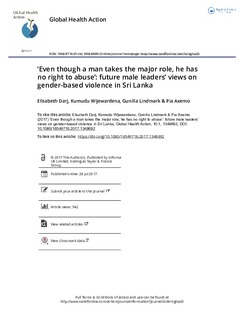| dc.contributor.author | Darj, Elisabeth | |
| dc.contributor.author | Wijewardena, Kumudu | |
| dc.contributor.author | Lindmark, Gunilla | |
| dc.contributor.author | Axemo, Pia | |
| dc.date.accessioned | 2018-06-25T06:28:16Z | |
| dc.date.available | 2018-06-25T06:28:16Z | |
| dc.date.created | 2017-10-02T09:34:43Z | |
| dc.date.issued | 2017 | |
| dc.identifier.citation | Global health action. 2017, 10 (1). | nb_NO |
| dc.identifier.issn | 1654-9880 | |
| dc.identifier.uri | http://hdl.handle.net/11250/2502736 | |
| dc.description.abstract | Background: Distinct gender roles influence gender inequality and build the foundation for gender-based violence. Violence against women is a major public health problem in all societies, and a violation of human rights. Prevalence surveys on gender-based violence have been published from Sri Lanka, but qualitative studies on men’s perceptions are lacking. Objectives: The aim of this study was to explore young educated Sri Lankan men’s perceptions of violence against women. Methods: Seven focus-group discussions were held. Men at the end of their university studies were purposefully selected. A topic guide was used, covering various scenarios of violence against women. Qualitative content analysis was carried out. Results: Four categories were developed through the analytic process: fixed gender roles – patriarchal values are accepted in society, female mobility control, and slowly changing attitudes; violence not accepted but still exists – sexual harassment exists everywhere, different laws for different people, female tolerance of violence, and men’s right to punish; multiple factors cause violence – alcohol, violent behavior is inherited, violence culturally accepted, low education, and lack of communication; and prevention of violence against women – both parents must engage and socialize girls and boys equally, life skills education, premarital counselling, working places value clarification, and more women in politics and boards are suggested. Conclusions: Medical and management students, possible future male leaders of the country, have suggestions of prevention strategies in life skills to reduce gender-based violence and to increase knowledge of health consequences with the aim of changing attitudes. | nb_NO |
| dc.language.iso | eng | nb_NO |
| dc.publisher | Taylor & Francis Group | nb_NO |
| dc.rights | Navngivelse 4.0 Internasjonal | * |
| dc.rights.uri | http://creativecommons.org/licenses/by/4.0/deed.no | * |
| dc.title | 'Even though a man takes the major role, he has no right to abuse': Future male leaders' views on gender-based violence in Sri Lanka | nb_NO |
| dc.type | Journal article | nb_NO |
| dc.type | Peer reviewed | nb_NO |
| dc.description.version | publishedVersion | nb_NO |
| dc.source.pagenumber | 9 | nb_NO |
| dc.source.volume | 10 | nb_NO |
| dc.source.journal | Global health action | nb_NO |
| dc.source.issue | 1 | nb_NO |
| dc.identifier.doi | 10.1080/16549716.2017.1348692 | |
| dc.identifier.cristin | 1501210 | |
| dc.description.localcode | © 2017 The Author(s). Published by Informa UK Limited, trading as Taylor & Francis Group. This is an Open Access article distributed under the terms of the Creative Commons Attribution License (http://creativecommons.org/licenses/by/4.0/), which permits unrestricted use, distribution, and reproduction in any medium, provided the original work is properly cited. | nb_NO |
| cristin.unitcode | 194,65,20,0 | |
| cristin.unitname | Institutt for samfunnsmedisin og sykepleie | |
| cristin.ispublished | true | |
| cristin.fulltext | original | |
| cristin.qualitycode | 1 | |

